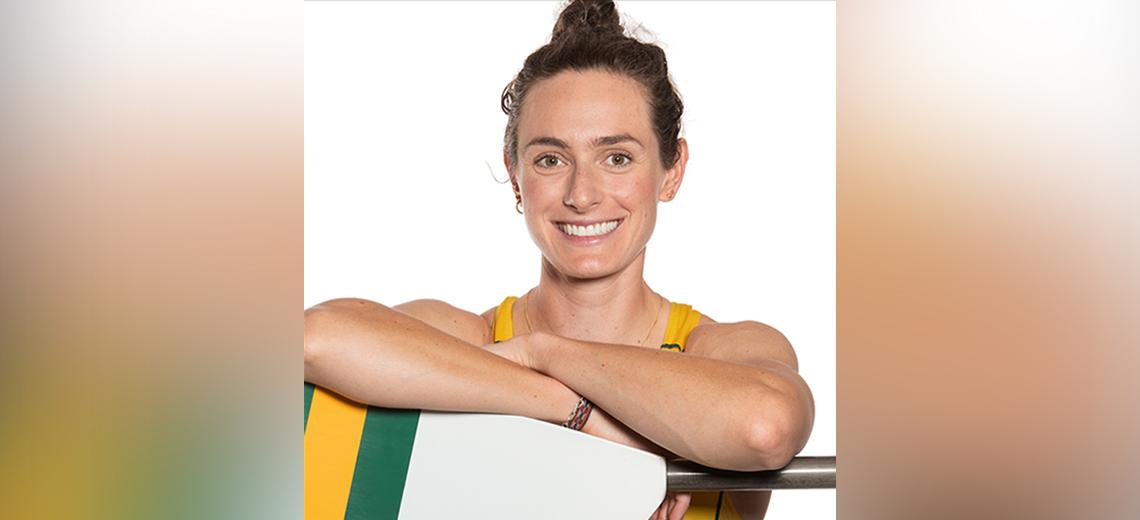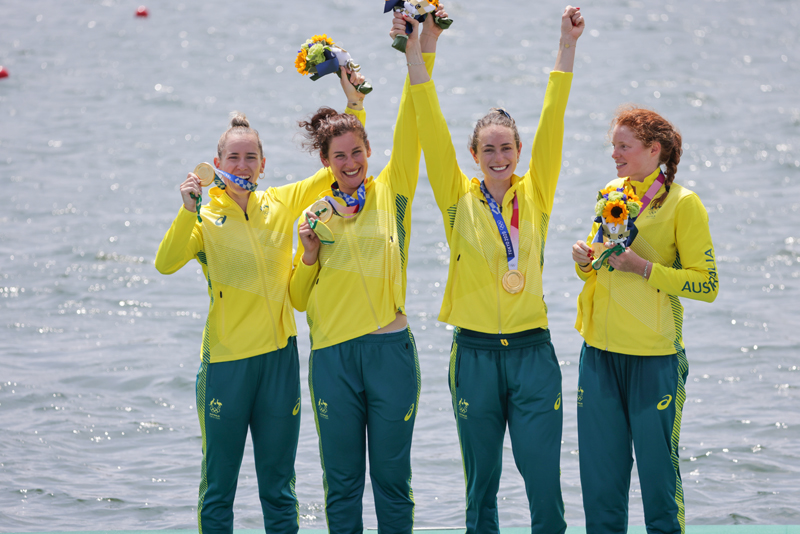
11 minute read
On 28 July, sixteen rowers won Olympic medals for Australia at the Tokyo Olympic Games.
Among them was Jessica Morrison, an alumna of the ANU College of Business and Economics (CBE).
Jessica, along with her teammates Annabelle McIntyre, Lucy Stephan and Rosie Popa, won the women’s four final with a close margin of 0.34 seconds in an Olympic record time.
Since graduating from the College with a Bachelor of Economics in 2015, Jessica has competed at the Olympics twice and won a number of rowing accolades, all whilst becoming a senior consultant at Ernst & Young.
CBE recently caught up with Jessica, who is currently taking a break from the oars in the US, to learn more about her and what led her to that gold medal.
In the first excerpts of a two-part interview, she sheds light on achieving success as an elite athlete, and recalls the emotions and elation she felt on that historic day.
Q. How have you transitioned from the euphoria of winning gold at the Olympics?
Winning was very surreal, as it was something I’d imagined myself achieving for my whole life – to successfully execute that perfect race when under pressure. It’s a success that is still slowly sinking in.
The Olympics itself was a unique experience, including having to leave two days after competing, instead of having a couple of weeks to experience the rest of the tournament and support the Australian contingent.
Fortunately, through numerous video catch-ups, I’ve been able to repeatedly share and relive my experiences. However, I have had to do most of my reflecting on my own. I’ve gone from practicing three times a day, to experiencing this new life without my teammates and my training. I’m trying to find a new purpose, which is an adjustment that I’m still navigating.
Q. How would you describe your experience at the Tokyo Olympics and what does winning the gold for Australia in rowing mean to you?
I’m grateful for the huge effort from the organisers in Japan and the International Olympic Committee, who ensured that my team and I were given the opportunity to not only race, but had the honour of representing Australia in such difficult times – that was really special.
The postponement of the Games, however, was testing; training for an extra year wasn’t easy. As a team, we had to turn this challenge into an opportunity to make gains and get faster. I used the extra year to get fitter and mentally stronger. My gold medal represents how resilient we were as a team, we worked hard to be better versions of our 2020 selves.
It was an amazing feeling to stand on the Olympic dais with my team, with medals around our necks and the Australian national anthem playing in the backdrop. Although I was unable to celebrate with my family, I was thinking of them and all the other people who helped me get to that dais – school teachers, swimming coaches, my training partners, people who have not just supported me over the last few years, but over the best part of 15 years of my life. My medal isn’t a win just for me, it’s for all those who helped me get there.

(L-R) Lucy, Rosie, Jessica and Annabelle.
Q. What emotions do you remember from that day?
I remember feeling very confident and excited on the start line; I wasn’t shaky or nervous. I knew we were going to have a great race because we had been visualising the moment for a very long time. It would come down to whether we could perform under pressure, which is the exciting yet challenging part for all elite athletes.
On the day of the finals, the conditions were tricky due to the wind, and I knew we had to minimise bad strokes to avoid losing speed. We had a great start to the race and as we started pulling away from our competitors, we relaxed a little and began to control the race. It was only towards the end, when the Dutch team came head-to-head with us, that I got a bit anxious. At that point, I thought, “now, at any moment, if we have a bad stroke, or we get too stressed, we could lose”. I knew however that we had done all the necessary practice to handle such a tense situation.
The race was so close that when we crossed the finish line I wasn’t sure if we had won. I turned to my teammate Lucy Stephan and asked “did we win?” and when she responded “we did it” I was so relieved. I saw all our coaches in the distance with their hands in the air screaming “go Aussies!” and I felt so proud. Ours was the first medal for Australia in rowing that day, and was promptly followed by another gold and two bronze. It’s one thing to have your own success, but to celebrate our collective triumph was awesome.
Unlike some of my team members, I did not cry, all I wanted to do was get on the phone to my parents and show them my medal. They were crying though! (Laughs).
Q. Aside from winning the gold medal, what was the most memorable moment in Tokyo for you?
At the Olympics, Annabelle and I also competed in the women’s pair category. Our semi-final race was rescheduled to two hours after the four’s final due to a typhoon on the previous day. Immediately after securing the gold, we had to quickly start thinking about the next race.
We didn’t qualify for the pair’s A final, which was disappointing. It was such a bitter-sweet day, winning one event and missing out on another. For me, this is memorable because it was something I’ve never been through before – the highs and lows of elite sport compressed within just a few hours.
Another memorable moment from the Games was meeting Susan O’Neil, a legendary Australian swimmer that I grew up idolising. She was at the Olympics as a staff member with the Australian contingent and I felt so lucky to meet her.
If anyone has a dream for themselves they should be open to the possibility that a different avenue than what was originally imagined could get them there.
Q. You’ve been an Olympian twice. What does it take to be an Olympian?
You need to be patient and open to opportunities.
I had planned to reach the Olympics through swimming, but an injury prevented me from realising this. When the opportunity arose for me to achieve my dream through rowing, I had to be open to that chance.
If anyone has a dream for themselves they should be open to the possibility that a different avenue than what was originally imagined could get them there. Athletes will always experience setbacks, but to overcome them they need to not lose sight of what they are trying to achieve.
Q. Is daydreaming about winning also part of the preparation?
For me it isn’t necessarily always about winning, it’s about trying to be the best that I can be. I think when you hold yourself to a high standard and don’t impose personal limitations, you can always achieve a lot more than you think. Winning is great, but could you do something better than winning? Could you set a world record? Do you want to win by a small margin or by an open water margin like in a rowing race? Constantly trying to improve your performance isn’t just about wanting to win.
Keep an eye out for the second part of Jessica’s interview. She will discuss her CBE journey, and developing a professional career alongside her sporting one.
The ANU College of Business and Economics offers an extensive range of specialised programs. Click here for more details.
